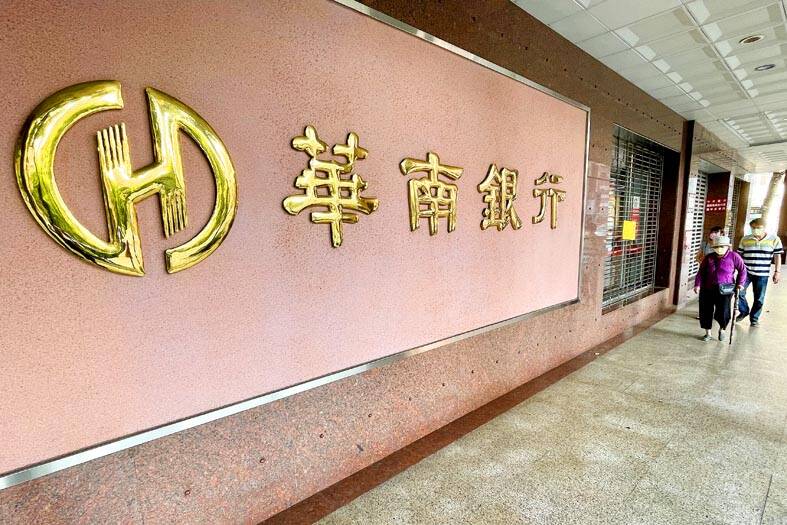State-run Hua Nan Financial Holding Co (華南金控) yesterday said that it is seeking to raise fee income by 10 percent this year, but would cautiously pursue loan growth as borrowing costs remain high amid uncertainty.
“We are looking for stable earnings this year in light of ongoing geopolitical tensions and fluid economic scenes at home and overseas,” Hua Nan Financial president Robert Li (李耀卿) told an investors’ conference in Taipei.
The bank-focused conglomerate’s net income last year rose 24.9 percent year-on-year to NT$21.62 billion (US$678.42 million), or earnings per share of NT$1.58.

Photo: George Tsorng, Taipei Times
Li attributed the extraordinary showing to hefty gains from financial product trading and investment at its main subsidiary Hua Nan Commercial Bank (華南銀行), which generated NT$20.05 billion in net income last year, up 20 percent year-on-year and accounting for 89 percent of the firm’s profit.
The lender’s outstanding loans last year grew 10 percent from a year earlier, but interest income dropped 15.1 percent, company data showed.
Li did not mention concrete loan-growth targets for this year, saying the firm prefers to maintain a cautious outlook for the sake of risk control.
Foreign exchange swaps drove NT$10 billion of profit last year, but that might slow down once the US Federal Reserve lowers interest rates, mitigating the interest rate gap between Taiwan and the US, Li said.
Restrictive monetary policy is favorable for interest income and swap operations while raising funding costs and curtailing loan demand, he said, adding that high interest rates benefit financial institutions with many US dollar-denominated assets.
On the other hand, interest rate cuts by the Fed would ease funding costs while raising the value of US dollar debt, the company said.
It added that a 70 percent of its debt position bears fixed interest income, a benefit that does not apply to bonds with floating rates.
Despite shrinking interest income, Hua Nan Bank enjoyed 15.9 percent growth in fee income last year, supported by a 19.2 percent advance in wealth management and a 14.3 percent increase in fund sales, company data showed.
Growth momentum in fee income is expected to continue this year at 10 percent, as demand for wealth management and fund products gains speed, it said.
Hua Nan Bank is expecting to reap a windfall from being the custodian bank of the two new hit exchange-traded funds (ETFs) — UPAMC Taiwan High Dividend Momentum ETF and Yuanta Taiwan Value High Dividend ETF.
The boom in ETFs featuring quarterly or monthly distributions of cash dividends has to do with Taiwan’s aging society, as such products promise better cash flow than time deposits and insurance policies, the firm said.
However, investors should be braced for volatility in their ETF portfolios, it said.

Intel Corp chief executive officer Lip-Bu Tan (陳立武) is expected to meet with Taiwanese suppliers next month in conjunction with the opening of the Computex Taipei trade show, supply chain sources said on Monday. The visit, the first for Tan to Taiwan since assuming his new post last month, would be aimed at enhancing Intel’s ties with suppliers in Taiwan as he attempts to help turn around the struggling US chipmaker, the sources said. Tan is to hold a banquet to celebrate Intel’s 40-year presence in Taiwan before Computex opens on May 20 and invite dozens of Taiwanese suppliers to exchange views

Application-specific integrated circuit designer Faraday Technology Corp (智原) yesterday said that although revenue this quarter would decline 30 percent from last quarter, it retained its full-year forecast of revenue growth of 100 percent. The company attributed the quarterly drop to a slowdown in customers’ production of chips using Faraday’s advanced packaging technology. The company is still confident about its revenue growth this year, given its strong “design-win” — or the projects it won to help customers design their chips, Faraday president Steve Wang (王國雍) told an online earnings conference. “The design-win this year is better than we expected. We believe we will win

Chizuko Kimura has become the first female sushi chef in the world to win a Michelin star, fulfilling a promise she made to her dying husband to continue his legacy. The 54-year-old Japanese chef regained the Michelin star her late husband, Shunei Kimura, won three years ago for their Sushi Shunei restaurant in Paris. For Shunei Kimura, the star was a dream come true. However, the joy was short-lived. He died from cancer just three months later in June 2022. He was 65. The following year, the restaurant in the heart of Montmartre lost its star rating. Chizuko Kimura insisted that the new star is still down

While China’s leaders use their economic and political might to fight US President Donald Trump’s trade war “to the end,” its army of social media soldiers are embarking on a more humorous campaign online. Trump’s tariff blitz has seen Washington and Beijing impose eye-watering duties on imports from the other, fanning a standoff between the economic superpowers that has sparked global recession fears and sent markets into a tailspin. Trump says his policy is a response to years of being “ripped off” by other countries and aims to bring manufacturing to the US, forcing companies to employ US workers. However, China’s online warriors